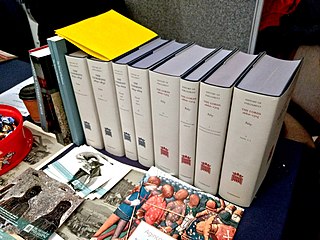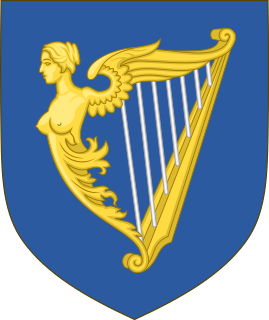
The Parliament of the United Kingdom of Great Britain and Northern Ireland, commonly known internationally as the UK Parliament, British Parliament, or Westminster Parliament, and domestically simply as Parliament, is the supreme legislative body of the United Kingdom, the Crown dependencies and the British Overseas Territories. It alone possesses legislative supremacy and thereby ultimate power over all other political bodies in the UK and the overseas territories. Parliament is bicameral but has three parts, consisting of the Sovereign, the House of Lords, and the House of Commons. The two houses meet in the Palace of Westminster in the City of Westminster, one of the inner boroughs of the capital city, London.
A member of parliament (MP) is the representative of the voters to a parliament. In many countries with bicameral parliaments, this category includes specifically members of the lower house, as upper houses often have a different title. Member of Congress is an equivalent term in other jurisdictions.

The Acts of Union 1800 were parallel acts of the Parliament of Great Britain and the Parliament of Ireland which united the Kingdom of Great Britain and the Kingdom of Ireland to create the United Kingdom of Great Britain and Ireland. The acts came into force on 1 January 1801, and the merged Parliament of the United Kingdom had its first meeting on 22 January 1801.
The House of Commons is the elected lower house of the bicameral parliaments of the United Kingdom and Canada and historically was the name of the lower houses of the Kingdom of England, Kingdom of Great Britain, Kingdom of Ireland, Northern Ireland, and Southern Ireland. Roughly equivalent bodies in other countries which were once part of the British Empire include the United States House of Representatives, the Australian House of Representatives, the New Zealand House of Representatives, and India's Lok Sabha.
The chamber of deputies is a legislative body in either a bicameral or a unicameral legislature.
Antrim Borough was a two-member borough constituency used to elect members of the Parliament of Ireland.
Mid Antrim was a UK Parliament constituency in Ireland which returned one Member of Parliament from 1885 to 1922, using the first past the post electoral system.
Baltimore was a potwalloper constituency represented in the Irish House of Commons from 1614 to 1801.
Carrickfergus was a constituency represented in the Irish House of Commons from 1326 to 1800.
Galway Borough was a constituency represented in the Irish House of Commons to 1800.
Doneraile was a constituency represented in the Irish House of Commons until 1800. Doneraile is in County Cork, Republic of Ireland.
Bannow was a constituency represented in the Irish House of Commons to 1800.
Athlone was a constituency represented in the Irish House of Commons until 1800. Between 1725 and 1793 Catholics and those married to Catholics could not vote. Following the Act of Union 1800 the borough became Athlone.
Kerry was a constituency represented in the Irish House of Commons to 1800. Following the Act of Union 1800 the county retained two seats.

In the first Parliament to be held after the Union of Great Britain and Ireland on 1 January 1801, the first House of Commons of the United Kingdom was composed of all 558 members of the former Parliament of Great Britain and 100 of the members of the House of Commons of Ireland.

Mid Antrim was a constituency of the Northern Ireland House of Commons.
Antrim County was a constituency represented in the Irish House of Commons until 1800.
Belfast was a constituency represented in the Irish House of Commons until 1800.

The House of Commons of Great Britain was the lower house of the Parliament of Great Britain between 1707 and 1801. In 1707, as a result of the Acts of Union of that year, it replaced the House of Commons of England and the third estate of the Parliament of Scotland, as one of the most significant changes brought about by the Union of the kingdoms of England and Scotland into the Kingdom of Great Britain.

The History of Parliament is a project to write a complete history of the United Kingdom Parliament and its predecessors, the Parliament of Great Britain and the Parliament of England. The history will principally consist of a prosopography, in which the history of an institution is told through the individual biographies of its members. After various amateur efforts the project was formally launched in 1940 and since 1951 has been funded by the Treasury. As of 2010 the volumes covering the House of Commons for the periods 1386–1421, 1509–1629, and 1660–1832 have been completed and published ; research work on the remaining periods and on the House of Lords is ongoing. In 2011 the completed sections were republished on the internet.






